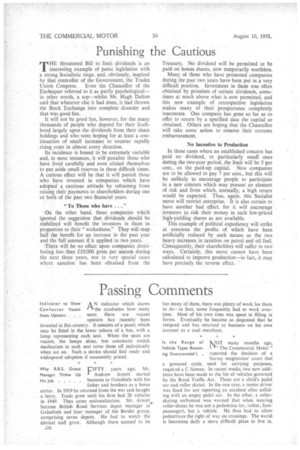Punishing the Cautious
Page 28

If you've noticed an error in this article please click here to report it so we can fix it.
THE threatened Bill to limit dividends is an I interesting example of panic legislation with a strong Socialistic tinge, and, obviously, inspired by that controller of the Government, the Trades Union Congress. Even the Chancellor of the Exchequer referred to it as partly psychological--in other words, a sop—whilst Mr. Hugh Dalton said that whatever else it had done, it had thrown the Stock Exchange into complete disorder and that was good fun.
It will not be good fun, however, for the many thousands of people who depend for their livelihood largely upon the dividends from their share holdings and who were hoping for at least a continuation of small increases to counter rapidly rising costs in almost every direction.
Its incidence is bound to be extremely variable and, in most instances, it will penalize those who have lived carefully and even stinted themselves to put aside small reserves in these difficult times. A curious effect will be that it will punish those who have invested in companies which have adopted a cautious attitude by refraining from raising their payments to shareholders duripg one or both of the past two financial years.
" To Those who have . .
On the other hand, those companies which ignored the suggestion that dividends should be stabilized will benefit the investors in them in proportion to their "wickedness." They will reap half the benefit for an increase in the past year and the full amount if it applied to two years.
..There will be no effect upon companies distributing less than £10,000 gross per annum during the next three years, nor in very special cases where sanction has been obtained from the Treasury. No dividend will be permitted to be paid on bonus shares, now temporarily worthless.
Many of those who have promoted companies during the past two years have been put in a very difficult position. Investment in them was often obtained by promises of certain dividends, sometimes at much above what is now permitted, and this new example of retrospective legislation makes many of their prospectuses completely inaccurate. One company has gone so far as to offer to return by a specified date the capital so obtained. Others are hopjng that the Chancellor will take some action to remove their extreme embarrassment.
No Incentive to Production In those cases where an established concern has paid no dividend, or particularly small ones during the two-year period, the limit will be 5 per cent., on the paid-up capital. New companies are to be allowed to pay 7 per cent., but this will be unlikely to encourage people to participate in a new concern which may present an element of risk and from which, normally, a high return would be expected. Thus, again, this Socialist move will restrict enterprise. • It is also certain to have another bad effect, for it will encourage investors to risk their money in such low-priced high-yielding shares as are available.
This example of political expediency wilt strike at concerns the profits of which have been artificially, reduced by such means as the two heavy increases in taxation on petrol and oil fuel. Consequently, their shareholders will suffer in two ways. Certainly, this move cannot have been calculated to improve production—in fact, it may have precisely the reverse effect.




















































































